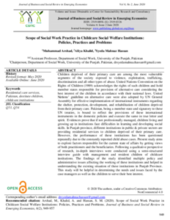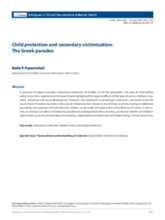Displaying 251 - 260 of 1510
In this commentary piece, Anne Longfield, Children’s Commissioner for England, explores the use of children's care homes in England and the need for improved supports to prevent placement in children's home and to provide for the needs of children and young people who are placed in these homes.
The purpose of this study was to longitudinally examine the effects of stigma on the development of children living in out-of-home care situations, specifically with regards to self-esteem and antisocial behavior.
Through the lens of institutional ethnography, this paper explores how experiences of education inside one Secure Children’s Home in England are shaped by the institution.
FICE Israel decided to initiate a short survey to document and share information about the way different countries handled their policies and practices in residential care facilities during that period. This report presents findings and some conclusions from this primary survey.
Present study aims to explore factors responsible for the current state of affairs for children living and growing up in institutions in Punjab province, Pakistan by getting views of both practitioners and the beneficiaries.
The first aim of this study was to examine differences in the socio-emotional functioning of adopted and institution-reared children in Chile. The second aim of this study was to examine the influence of adoption related variables on the psychological adjustment of adopted children.
This article from UNICEF Cambodia describes how UNICEF and its partners are responding to the needs of children in residential care during the COVID-19 pandemic.
This study aims at comparing subjective well-being (SWB) of children in residential care and in foster families in two European territories or jurisdictions: Portugal and Catalonia (Spain).
In this study, the authors interviewed social care practitioners including directors, senior and middle managers, frontline social workers, social worker‐academics and family support workers who work with vulnerable children to identify the issues and concerns held by social care workers about placing vulnerable children in boarding schools.
This article argues that Greece's use of closed-type institutions for child protection is violation of children’s rights and a practice of secondary victimization, stigmatization and exclusion of children living in these institutions.




